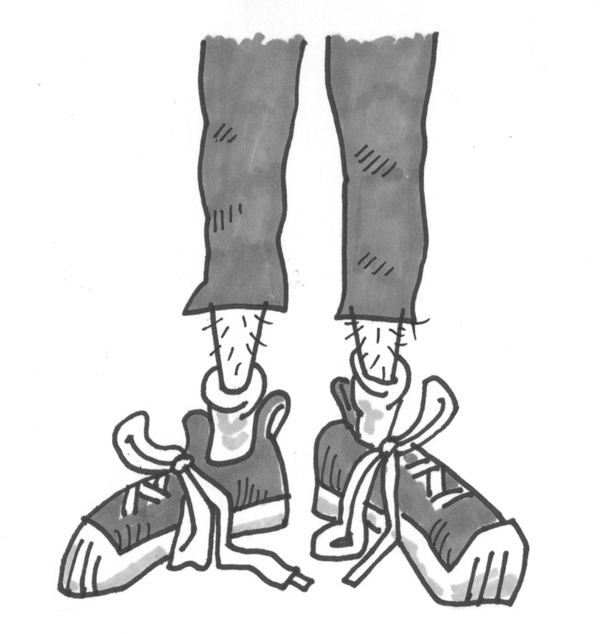
REMEMBER WHEN YOUR teen was a baby just learning to walk? What a milestone. You didn‘t want to miss any of it, and you were very supportive and encouraging. You would take her little hands in yours and start walking along with her—but you knew you had to let go in order for her to walk by herself. You also knew she might fall when you let go, but you had faith that this was just part of the process. So, you let go, and she took a few wobbly steps and fell. What did you do? You probably encouraged, Look what you did You took a few steps. You can do it. Let ‘s try again. You were both having a great time. When she got tired of the game and didn’t want to practice walking anymore, you backed off and waited awhile. You knew she would master walking in time, and you were having a ball supporting her in the process.
Meanwhile, you prepared her environment. You childproofed your home. You covered sharp corners and removed breakable objects that could hurt your child. You created a safe space in which she could expand her skills. We call this bridge building, and we think of you as a bridge builder. When your children are small and helpless, you build bridges that have sides close together, so your children have safety with room to move about, experiment, learn, and grow. As your children get older and more skilled, you move the sides of their bridges farther apart so they have more room to move about freely while continuing to be safe.
Are You Building Appropriate Bridges for Your Teen?
NOW YOU HAVE a teen who is learning to be an adult. Where are the sides of the bridge today? Are you closing them in because of your fears? Are you expanding them to support her process? Do you know you have to let go before she can ever master adulthood? Do you know that when you do let go, she will stumble and fall? When she falls or makes a mistake, do you understand that this is just part of the growing process? (Didn‘t you stumble and fall and make mistakes?) Do you encourage and cheer and show your faith in her to make it? Do you offer guidance and teach skills in respectful ways that invite listening and provide practice—whoever said that practice means perfect? Practice is part of the developmental growth process.
Do You Understand the Developmental Growth Process?
ADOLESCENCE IS AN important part of the individuation process. During this time, teens try to find out who they are and separate from their parents. The problem is that most parents tend to do many things during this time that make situations worse instead of better. This book will help you educate, challenge, and support teens in an atmosphere of mutual respect that affirms your self-worth as well as the self-worth of your children. It is also a time when you can explore your own unresolved teen issues.
Every chapter in this book has such valuable information that it was difficult to decide which chapters should be at the beginning. We thought all of the chapters warranted at least first or second status. Therefore, read the chapters in any order that appeals to you, because all of them will help you retrain yourself so you can parent your teen more effectively—and with perspective.
Have You Lost Your Perspective and Your Sense of Humor?
WE HOPE THAT you are operating in a kind, firm, and encouraging way. We know that going through the teen years can be like going through a war zone for both you and your teens and that it is easy for kindness and firmness to fall away and be replaced by less encouraging parenting methods. It is easy to lose your sense of awe along with your sense of humor—remember how cute and adorable you thought your teen was when he stumbled as a baby—and your loving ways when you look at your teen and ask yourself, What have I created? Who is this person? How did this happen? What do I do now?
There are many challenges and difficulties facing you as the parent of a teenager. Do you think that your teenager should be perfect by now, after all the years you have spent raising her? Actually, she is perfect—perfect in her individuation (rebellion) process, although that ‘s probably not what you had in mind. Maybe you have forgotten about or weren‘t aware of the individuation process, so you are panicking. You may be taking her rebellious behavior personally and thinking you are a failure. If everything seems out of control, perhaps you are questioning what you have been doing. Perhaps you are thinking, Maybe I should be more controlling. Control would keep my teenager from being so obnoxious and will save her from making mistakes that could drastically affect the rest of her life—if she lives You may not like to hear this, but control does not work with teens.
Do You Have the Illusion That Control Is Effective with Teensagers?
ALTHOUGH CONTROL SOMETIMES provides the illusion of success on a short-term basis, children who are raised with both choices and responsibility are more comfortable individuating under their parents ‘ noses instead of going underground. And you don ‘t want your children to go underground, because then they lose out on the best support and help they can get during these years—yours This book will help you find answers and principles that work instead of throwing in the towel or giving up on your child or yourself. Working with your teenager can become an opportunity to learn or relearn the meaning of mutual respect and help you sort out the differences between your issues and hers. When you learn to parent with kindness and firmness instead of control, you ‘ll truly see what a fascinating individual your teen is.
How Will Your Teen React to Your New Parenting Skills?
IF YOU HAVE parented your child with an iron fist up to this point, your teen will love you for giving her more room, but she may misunderstand what having more freedom and choices truly means. In that case it will be up to you to help her understand the responsibility that goes with choices. This book will show you many ways to get that message across successfully.
If you have spoiled and overprotected your children, your teen won ‘t be thrilled to start taking more responsibility. She may be used to you doing everything for her. She may think that responsibility is your job. She may be unskilled and lazy and maybe even a little bit afraid. What if she really can ‘t do what is needed? What if she looks stupid trying? What if it is stressful taking on more? Be prepared for when your teen tries to convince you that it is your job as the parent to continue doing for her what she could learn to do for herself. Be ready for her anger at you as you hold her accountable for her behavior. Once she finishes her temper tantrum, you will be amazed at how easily she takes to being more responsible.
Have You Forgotten That You Count, Too?
ONE OF THE biggest changes we hope you will make as you read this book is to put yourself back in the picture. If you are reading this book, we know that you believe kids count, but have you remembered that you count, too? The more you consider your needs along with your teenager ‘s, the quicker you will be able to feel better about both your teen and yourself.
Does Your Teen Have the Same Needs as Other Teens?
WE USE THE word teen loosely in our book to refer to a wide variety of young people. As you read the examples, keep in mind who you are dealing with in your family. Is your teen mature for her age? Is she a late bloomer? Some of our stories, activities, and suggestions are more appropriate for the teen who needs the sides of the bridge to be wider, while others are for the new teen who is beginning to test her wings. Because you are the bridge builder, it is important that you work with your teen to create the right amount of space as it is needed.
Are You Working with Your Teen?
NOTICE THAT WE say work with your teen. It ‘s perfectly fine to start from wherever you are. However, instead of trying to fix, manage, or control everything yourself, it ‘s time to create a dialogue and a method for involving your teen in the process of growing up. Your job is to prepare your teen for life. Perhaps you wish you had started when she was younger. That would have been nice, but if you didn‘t, it is time to start now. Remember to take small steps and work on your new skills one at a time until you feel more comfortable with them. You ‘ll find parenting so much easier when you do this. This book will show you how.
Your Price: $11.99


